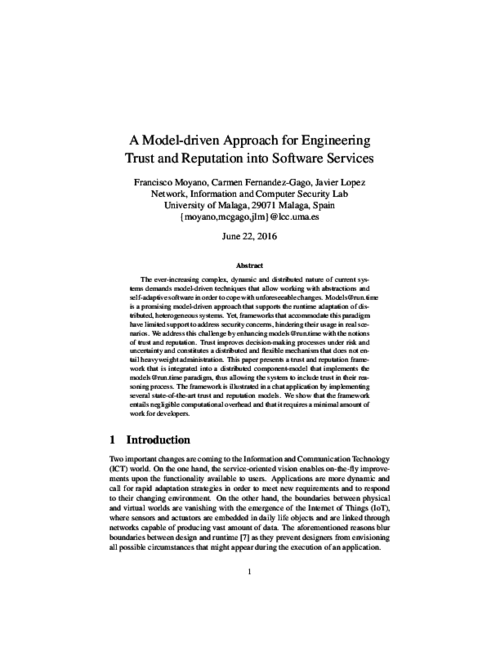International Workshop on Quantitative Aspects in Security Assurance, 2012.
Abstract
During the last decades, a huge amount of trust and reputation models have been proposed, each of them with their own particularities and targeting different domains. While much effort has been made in defining ever-increasing complex models, little attention has been paid to abstract away the particularities of these models into a common set of easily understandable concepts. We propose a conceptual framework for computational trust models that is used for developing a component-oriented development framework that aims to assist developers during the implementation phase.
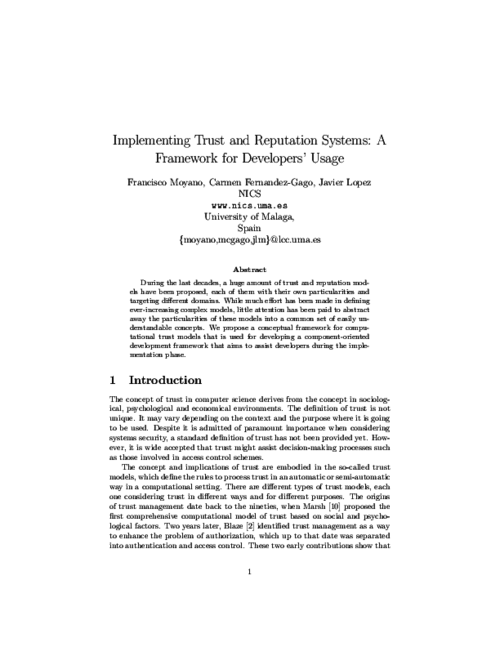
Digital Home Networking, R. Carbou, M. Diaz, E. Exposito, and R. Roman Eds., pp. 139-202, 2011.
8th International Workshop on Security and Trust Management (STM 2012), A. Jøsang, P. Samarati, and M. Petrocchi Eds., LNCS 7783, Springer, pp. 113-128, 2013. DOI
Abstract
During the last years, many trust and reputation models have been proposed, each one targeting different contexts and purposes, and with their own particularities. While most contributions focus on defining ever-increasing complex models, little attention has been paid to the process of building these models inside applications during their implementation. The result is that models have traditionally considered as ad-hoc and after-the-fact solutions that do not always fit with the design of the application. To overcome this, we propose an object-oriented development framework onto which it is possible to build applications that require functionalities provided by trust and reputation models. The framework is extensible and flexible enough to allow implementing an important variety of trust models. This paper presents the framework, describes its main components, and gives examples on how to use it in order to implement three different trust models.
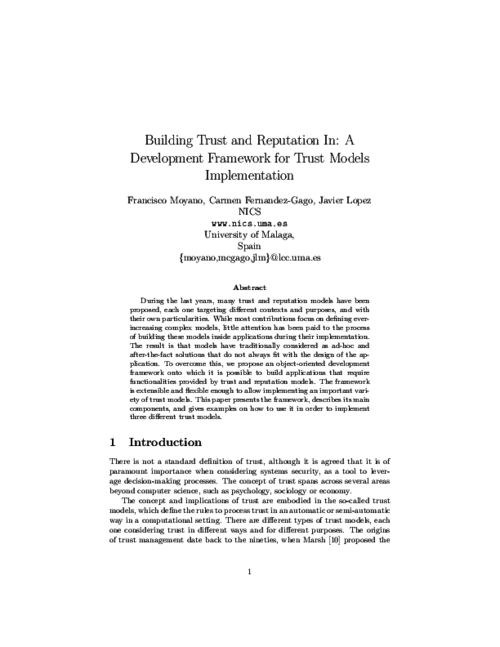
The 30th ACM/SIGAPP Symposium On Applied Computing (SAC 2015), pp. 1344-1349, 08/2015. DOI
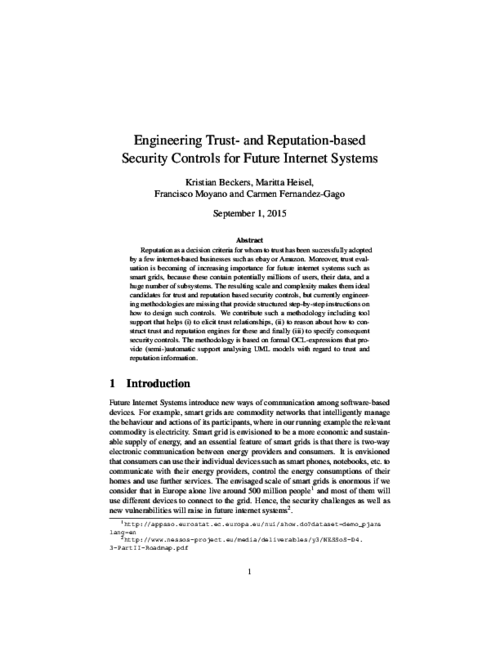
Proceedings of the Doctoral Symposium of the International Symposium on Engineering Secure Software and Systems (ESSoS-DS 2012), J. Cuellar, and N. Koch Eds., CEUR-WS 834, CEUR-WS, pp. 41-46, 2012.
Abstract
As the Future Internet arrives, more complex, service-based applications are spreading. These applications pose several challenges, including the huge amount of entities that must interact and their het- erogeneity. The success of these applications depends on the collaboration and communication of these entities, that might belong to different or- ganizations and administrative domains. Therefore, trust and reputation become two crucial issues. We propose the specification and design of a service-based security architecture that stresses the delivery of trust and reputation services to any application that might require them.
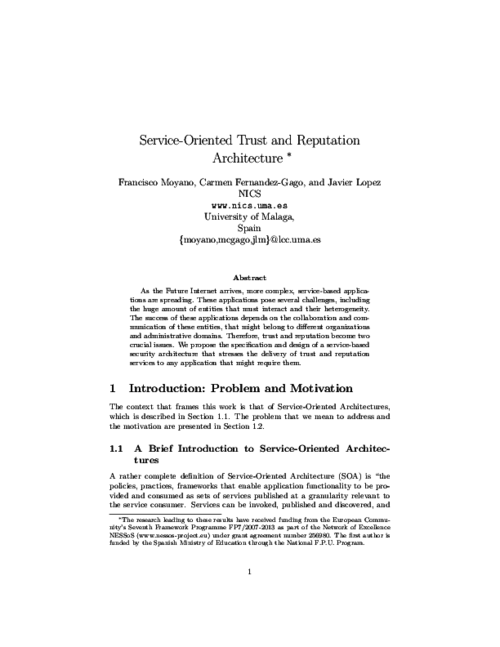
7th IFIP WG 11.11 International Conference on Trust Management (IFIPTM 2013), C. Fernandez-Gago, I. Agudo, F. Martinelli, and S. Pearson Eds., AICT 401, Springer, pp. 255-262, Jun 2013. DOI
Abstract
The Future Internet (FI) comprises scenarios where many heterogeneous and dynamic entities must interact to provide services (e.g., sensors, mobile devices and information systems in smart city scenarios). The dynamic conditions under which FI applications must execute call for self-adaptive software to cope with unforeseeable changes in the application environment. Software engineering currently provides frameworks to develop reasoning engines that automatically take reconfiguration decisions and that support the runtime adaptation of distributed, heterogeneous applications. However, these frameworks have very limited support to address security concerns of these application, hindering their usage for FI scenarios. We address this challenge by enhancing self-adaptive systems with the concepts of trust and reputation. Trust will improve decision-making processes under risk and uncertainty, in turn improving security of self-adaptive FI applications. This paper presents an approach that includes a trust and reputation framework into a platform for adaptive, distributed component-based systems, thus providing software components with new abilities to include trust in their reasoning process.
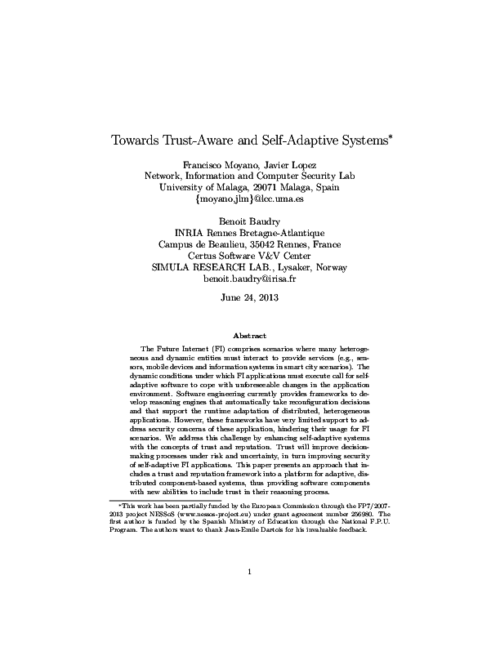
Smart Grid Security - Second International Workshop, J. Cuellar Eds., LNCS 8448, Springer, pp. 166-180, Aug, 2014. DOI
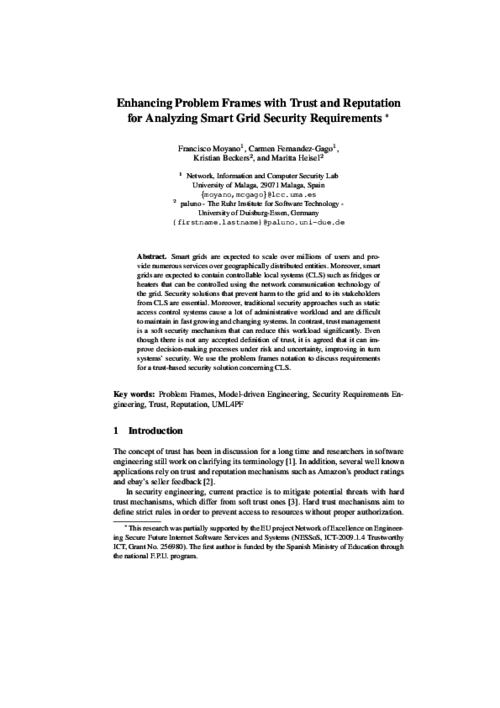
Proceedings of the 2012 International Symposium on Engineering Secure Software and Systems (ESSoS 2012), G. Barthe, B. Livshits, and R. Scandariato Eds., LNCS 7159, Springer, pp. 76–89, Feb 2012. DOI
Abstract
Trust has become essential in computer science as a way of assisting the process of decision-making, such as access control. In any system, several tasks may be performed, and each of these tasks might pose different associated trust values between the entities of the system. For instance, in a file system, reading and overwriting a file are two tasks that pose different trust values between the users who can carry out these tasks. In this paper, we propose a simple model for automatically establishing trust relationships between entities considering an established order among tasks.
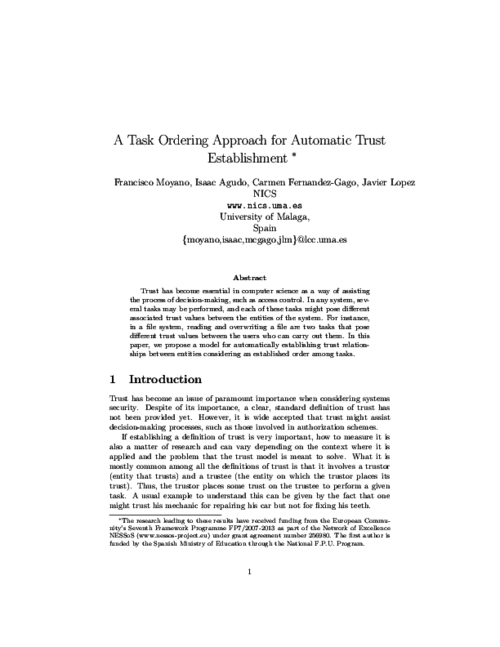
3rd International Workshop on Information Systems Security Engineering (WISSE 2013), X. Franch, and P. Soffer Eds., LNBIP 148, Springer-Verlag, pp. 490-501, Jun 2013. DOI
Abstract
Security must be a primary concern when engineering Future Internet (FI) systems and applications. In order to achieve secure solutions, we need to capture security requirements early in the Software Development Life Cycle (SDLC). Whereas the security community has traditionally focused on providing tools and mechanisms to capture and express hard security requirements (e.g. confidentiality), little attention has been paid to other important requirements such as trust and reputation. We argue that these soft security requirements can leverage security in open, distributed, heterogeneous systems and applications and that they must be included in an early phase as part of the development process. In this paper we propose a UML extension for specifying trust and reputation requirements, and we apply it to an eHealth case study.
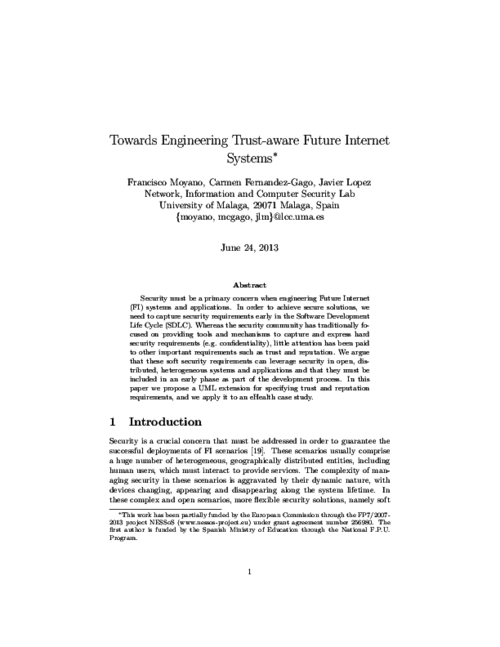
Engineering Secure Future Internet Services and Systems, vol. LNCS 8431, no. 8431, Springer, pp. 180-209, 03/2014. DOI
Abstract
The Future Internet (FI) comprises scenarios where many heterogeneous and dynamic entities must interact to provide services (e.g., sensors, mobile devices and information systems in smart city scenarios). The dynamic conditions under which FI applications must execute call for self-adaptive software to cope with unforeseeable changes in the application environment. Models@run.time is a promising model-driven approach that supports the runtime adaptation of distributed, heterogeneous systems. Yet frameworks that accommodate this paradigm have limited support to address security concerns, hindering their usage in real scenarios. We address this challenge by enhancing models@run.time with the concepts of trust and reputation. Trust improves decision-making processes under risk and uncertainty and constitutes a distributed and flexible mechanism that does not entail heavyweight administration. This chapter introduces a trust and reputation framework that is integrated into a distributed component model that implements the models@run.time paradigm, thus allowing software components to include trust in their reasoning process. The framework is illustrated in a smart grid scenario.
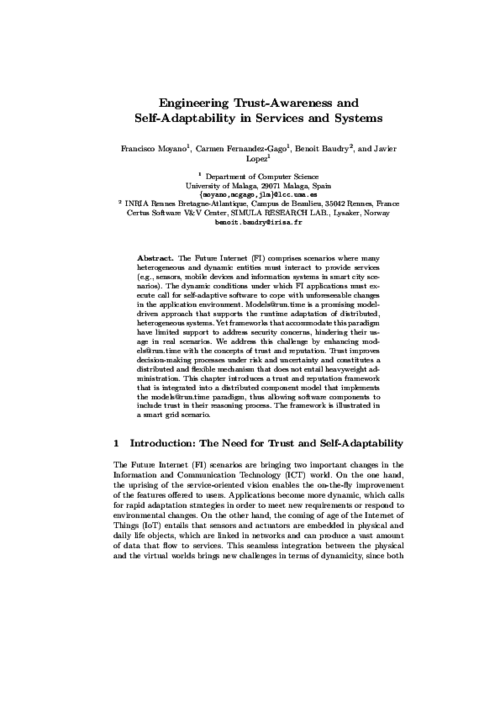
9th International Conference on Trust, Privacy & Security in Digital Business (TrustBus 2012), S. Fischer-Hübner, S. Katsikas, and G. Quirchmayr Eds., LNCS 7449, Springer Verlag, pp. 93-104, Sep 2012. DOI
Abstract
During the last twenty years, a huge amount of trust and reputation models have been proposed, each of them with their own particularities and targeting different domains. While much effort has been made in defining ever-increasing complex models, little attention has been paid to abstract away the particularities of these models into a common set of easily understandable concepts. We propose a conceptual framework for computational trust models that will be used for analyzing their features and for comparing heterogeneous and relevant trust models.
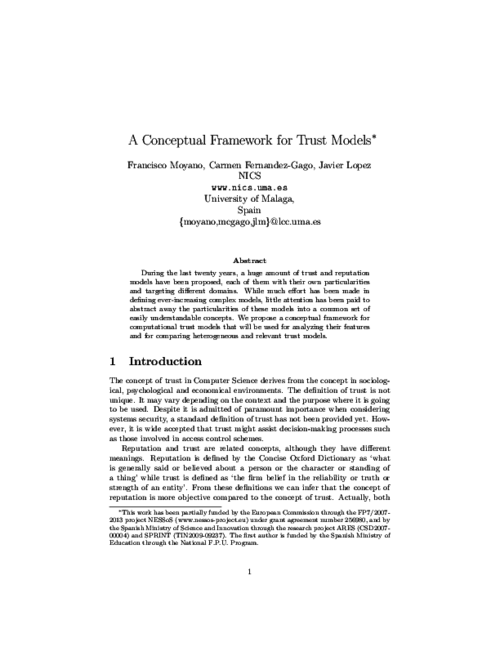
Requirements Engineering, vol. 18, issue 4, Springer London, pp. 321-341, Nov 2013. DOI
Abstract
Cloud applications entail the provision of a huge amount of heterogeneous, geographically-distributed resources managed and shared by many different stakeholders who often do not know each other beforehand. This raises numerous security concerns that, if not addressed carefully, might hinder the adoption of this promising computational model. Appropriately dealing with these threats gains special relevance in the social cloud context, where computational resources are provided by the users themselves. We argue that taking trust and reputation requirements into account can leverage security in these scenarios by incorporating the notions of trust relationships and reputation into them. For this reason, we propose a development framework onto which developers can implement trust-aware social cloud applications. Developers can also adapt the framework in order to accommodate their application-specific needs.
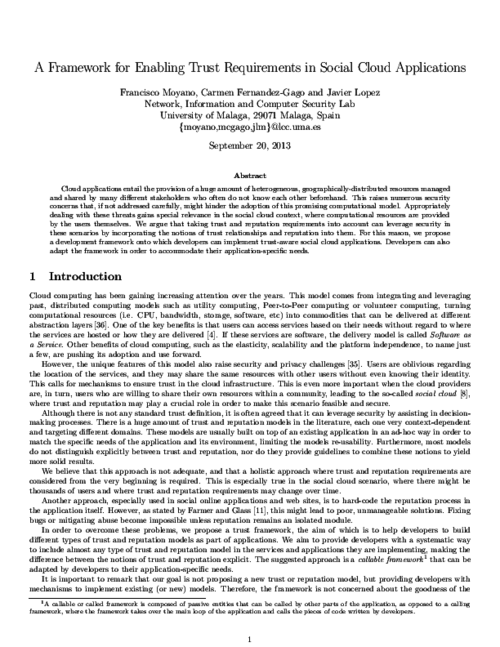
26th International Conference on Advanced Information Systems Engineering (CAiSE 2014), M. Jarke, et al. Eds., LCNS 8484, Springer, pp. 136-149, 06/2014. DOI
Abstract
Cloud sourcing consists of outsourcing data, services and infrastructure to cloud providers. Even when this outsourcing model brings advantages to cloud customers, new threats also arise as sensitive data and critical IT services are beyond customers' control. When an organization considers moving to the cloud, IT decision makers must select a cloud provider and must decide which parts of the organization will be outsourced and to which extent. This paper proposes a methodology that allows decision makers to evaluate their trust in cloud providers. The methodology provides a systematic way to elicit knowledge about cloud providers, quantify their trust factors and aggregate them into trust values that can assist the decision-making process. The trust model that we propose is based on trust intervals, which allow capturing uncertainty during the evaluation, and we define an operator for aggregating these trust intervals. The methodology is applied to an eHealth scenario.
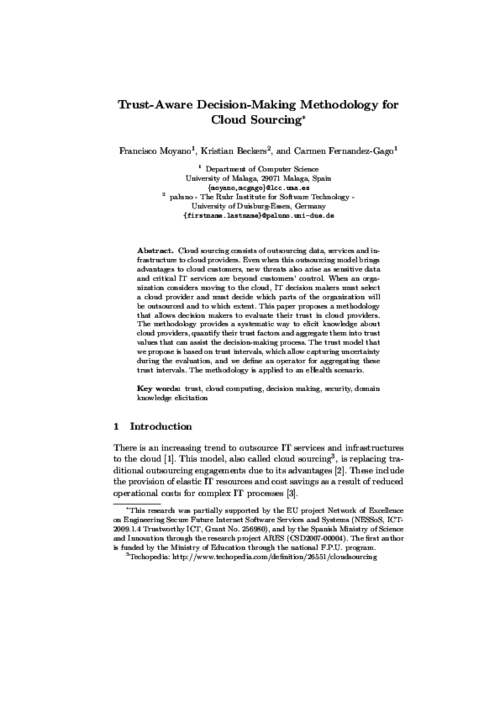
Doctoral Symposium of the International Symposium on Engineering Secure Software and Systems (ESSoS-DS 2013), M. Heisel, and E. Marchetti Eds., CEUR-WS 965, CEUR-WS, pp. 7-12, 2013.
Abstract
The Future Internet is posing new security challenges as their scenarios are bringing together a huge amount of stakeholders and devices that must interact under unforeseeable conditions. In addition, in these scenarios we cannot expect entities to know each other beforehand, and therefore, they must be involved in risky and uncertain collaborations. In order to minimize threats and security breaches, it is required that a well-informed decision-making process is in place, and it is here where trust and reputation can play a crucial role. Unfortunately, services and applications developers are often unarmed to address trust and reputation requirements in these scenarios. To overcome this limitation, we propose a trust and reputation framework that allows developers to create trust- and reputation-aware applications.
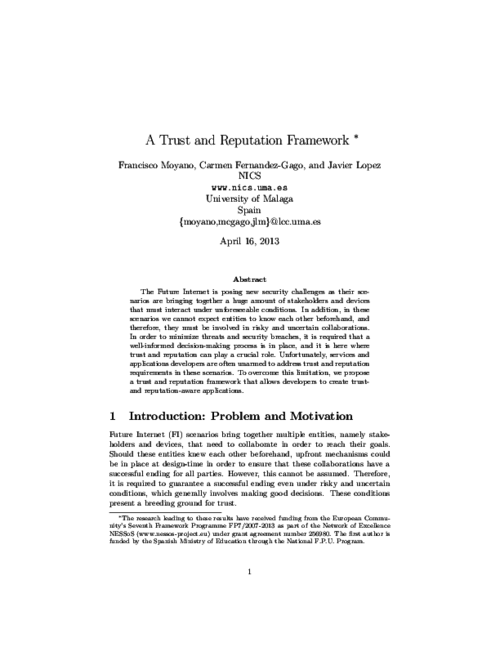
Journal of Network and Computer Applications, vol. 69, Elsevier, pp. 134-151, 04/2016.
 ]
] 